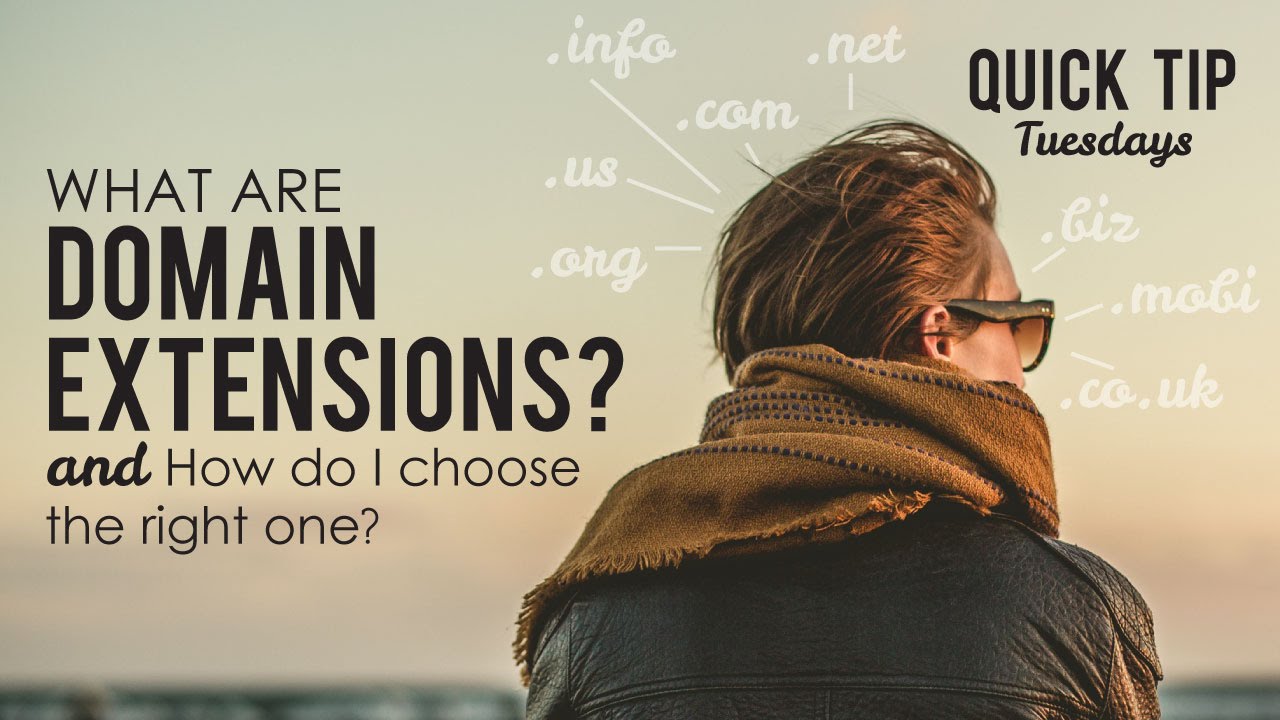How To Choose The Right Domain Extension For Your Business
Choosing the right domain extension can be a game-changer for your business, so make it count! Learn how to choose one that reflects your brand and resonates with your target audience.

Thomas Mitchell
Feb 03, 2025
Selecting the right domain extension is a crucial decision for any business looking to establish a strong online presence. Your domain extension impacts not only your website's credibility but also brand perception, search engine rankings, and audience trust. With so many options available today ranging from traditional extensions like .com and .org to industry-specific ones like .tech or .shop choosing the best fit can be overwhelming.
A well-chosen domain extension enhances your brand identity, aligns with your business goals, and ensures long-term digital success. Understanding the differences between various extensions and their effects on SEO and user trust can help you make an informed decision. This article provides a detailed guide on selecting the best domain extension for your business needs.
What Is A Domain Extension?

What are Domain Extensions and How do I Choose a Domain Extension?
A domain extension, also known as a Top-Level Domain (TLD), is the suffix at the end of a web address. It helps categorize websites based on their purpose, geographical location, or industry. Think of it like the last piece of a jigsaw puzzlethat completes the picture of your online identity. For example:
- .com- Commercial businesses (most popular and widely recognized).
- .org- Nonprofit organizations, charities, and communities.
- .net- Originally for networking-related businessesbut now used more generally.
- .edu- Educational institutions such as universities.
- .gov- Government agencies.
Domain extensions play a key role in branding, SEO, and audience targeting. Businesses must choose an extension that best represents their mission and services.
Why Choosing The Right Domain Extension Matters
The domain extension you choose influences:
1. Brand Recognition And Trust
A well-known domain extension like .comfosters credibility and trust. Users often perceive unfamiliar extensions as less reliable, making brand recognition harder.
2. SEO And Search Engine Rankings
Google treats all TLDs equally in rankings, but user behavior matters. Websites with trusted extensions often get higher click-through rates, which can impact SEO. Ignoring user trust and choosing an obscure or irrelevant TLD could even make you a target for negative SEO, as it might make your site seem less credible.
3. Industry And Audience Relevance
Choosing an extension that aligns with your business niche strengthens brand positioning. For example, a tech startupbenefits from a .techdomain, while an e-commerce businessmay prefer .store.
4. Geographical Targeting
A country-code Top-Level Domain (ccTLD)like .ukor .casignals a localized business presence, improving search visibility in specific regions.
Choosing the right extension ensures business legitimacy, SEO advantages, and audience engagement.
Popular Types Of Domain Extensions
There are three main categories of domain extensions:
1. Generic Top-Level Domains (gTLDs)
gTLDs are common and not restricted to specific locations. They include:
- .com- Best for businesses of all types.
- .org- Ideal for nonprofit organizations.
- .net- Suitable for technology-related businesses.
- .info- Used for informational websites.
- .biz- Business-related sites (less popular than .com).
2. Country-Code Top-Level Domains (ccTLDs)
ccTLDs target specific geographical regions, helping businesses rank better locally. Examples include:
- .uk- United Kingdom
- .ca- Canada
- .au- Australia
- .de- Germany
If your business serves a specific country, using a ccTLDboosts local search rankingsand user trust.
3. New GTLDs And Industry-Specific Extensions
The rise of new gTLDsallows businesses to choose extensions that reflect their niche:
- .tech- Technology startups and IT companies.
- .store- E-commerce and online stores.
- .app- Mobile applications.
- .law- Law firms and legal services.
- .photography- Photography businesses.
Industry-specific TLDs can strengthen branding but may not be as trustedas .com or .org.
How To Choose The Right Domain Extension For Your Business

What Domain Extension should I use for my Business Website?
1. Consider Your Industry And Business Type
Different industries benefit from different domain extensions. Choose one that reflects your field:
- Technology:.tech, .io
- E-commerce:.store, .shop
- Real Estate:.realty, .homes
- Legal Services:.law, .legal
- Education:.edu, .academy
2. Prioritize Trust And Credibility
Users instinctively trust .comover newer extensions. If .com isn’t available, consider .netor .cobefore choosing a less common extension.
3. Decide Between Global Vs. Local Targeting
- If your business is global, go for .comor .net.
- If you target a specific country, a ccTLD (.uk, .au, .ca)is better for local SEO and trust.
4. Consider SEO And Ranking Factors
Google does not prioritize specific TLDs, but user behavior does. A .com domain might have higher click-through rates (CTR) because users recognize and trust it more. This highlights the importance of considering user experience alongside other basic SEO thingslike keyword research and content optimization.
5. Check Availability And Pricing
Some domain extensions are cheaperthan others. However:
- Premium domains(like hotels.com) cost thousands of dollars.
- Newer TLDs can have higher renewal fees.
Always check long-term costs and availability before purchasing.
Best Practices For Selecting Your Domain Extension
- Keep it Short and Memorable:A shorter domain name is easier to remember and type.
- Use Relevant Keywords:Include relevant keywords in your domain name (before the extension) to improve search visibility.
- Avoid Hyphens and Numbers:Hyphens and numbers can make your domain name difficult to remember and can look unprofessional.
- Choose the Right TLD:Select an extension that aligns with your brand, target audience, and business goals.
- Check for Trademark Conflicts:Ensure that your domain name does not infringe on any existing trademarks.
- Register Multiple Extensions (Optional):Consider registering multiple extensions to protect your brandand prevent competitors from using similar names. For example, you could register both .com and .net versions of your domain name.
- Secure Your Domain Privacy:Protect your personal information by opting for domain privacy services.
Common Mistakes To Avoid
- Choosing an Irrelevant Extension:Selecting an extension that doesn't align with your brand identity can confuse your audience.
- Ignoring Availability:Failing to check the availability of your desired domain name can lead to disappointment and force you to choose a less desirable option.
- Focusing Solely on Price:While cost is a factor, it shouldn't be the primary driver of your decision. Prioritize brand fit and relevance over the cheapest option.
- Neglecting Domain Privacy:Failing to secure domain privacy can expose your personal information to the public.
- Procrastinating Domain Registration:Delaying your domain registration can lead to someone else snatching up your desired domain name.
FAQs
How Much Does A Domain Name Cost?
The cost of a domain name varies depending on the extension, the registrar, and any special offers. Generally, .com domains are the most common and can range from $10-$20 per year. Newer extensions might have different pricing structures.
How Do I Check If A Domain Name Is Available?
You can use a domain name registrar's website to check the availability of a domain name. Most registrars have a search tool where you can enter your desired domain name and see which extensions are available.
What Domain Extension Should I Use For My Business?
When deciding on a domain extension, you should almost always choose .com if it's available. The .com TLD is usually the best choice because it's most familiar. Humans are creatures of habit. We've all been typing .com domains into our web browser for decades, so it's what we've come to expect from websites.
Do New TLDs Impact Credibility?
Credibility depends more on your overall website quality, content, and user experience than the extension itself. Well-executed websites can build trust regardless of the TLD.
Final Thoughts
Choosing the right domain extension is a vital step in establishing your online presence. While .com remains the best choice for credibility, other extensions like .net, .org, or industry-specific TLDs can work depending on your business goals. If targeting a specific country, ccTLDs enhance local SEO and trust.
Take the time to assess your business needs, audience location, and branding goals before deciding. A well-chosen domain extension supports long-term success and ensures your website is memorable, professional, and SEO-friendly.